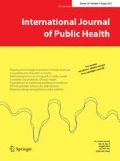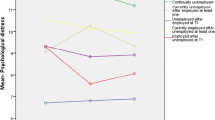Abstract
Objectives
To examine the associations between economic and noneconomic factors and psychological distress in a group of 748 unemployed adults during economic recession.
Methods
Data were collected through a questionnaire. Bivariate and logistic regression analyses were used to test the associations between distress and the deprivation of income and latent benefits of employment (time structure, activity, status, collective purpose and social contact).
Results
The participants’ mean of distress was higher than the national population mean, and 46.5% of the participants scored above that. All economic and noneconomic factors emerged as strong predictors of distress; particularly financial deprivation (OR 1.06; CI 95 % 1.04–1.09) and lack of structured time (OR 1.07; CI 95 % 1.05–1.09). Women (OR 1.40; CI 95 % 1.04–1.86) and people with lower education levels (OR 0.45; CI 95 % 0.34–0.61) were more affected.
Conclusions
The unemployed individuals score high on distress, especially those facing financial strain and lack of structured time, and women and individuals with lower education in particular. Given the recessionary context and high unemployment rates, these insights raise awareness for policies and actions targeting the needs of unemployed people.
Similar content being viewed by others
References
Berchick ER, Gallo WT, Maralani V, Kasl SV (2012) Inequality and the association between involuntary job loss and depressive symptoms. Soc Sci Med 75(10):1891–1894
Breslin MJ, Breslin Z (2013) Unemployment and psychological well-being in post Celtic Tiger Ireland. Irish J Psychol 34(2):67–80
Clark A, Georgellis Y, Sanfey P (2001) Scarring: the psychological impact of past unemployment. Economica 68(270):221–241
Clemens T, Popham F, Boyle P (2015) What is the effect of unemployment on all-cause mortality? A cohort study using propensity score matching. Eur J Public Health 25(1):115–121
Creed PA, Bartrum DA (2008) Personal control as a mediator and moderator between life strains and psychological well-being in the unemployed. J Appl Soc Psychol 38(2):460–481
Creed PA, Klisch J (2005) Future outlook and financial strain: testing the personal agency and latent deprivation models of unemployment and well-being. J Occup Health Psychol 10(3):251–260
Creed PA, Macintyre SR (2001) The relative effects of deprivation of the latent and manifest benefits of employment on the well-being of unemployed people. J Occup Health Psychol 6(4):324–331
European Commission (2010) Mental health: Special Eurobarometer 345 / Wave 73.2. Brussels:TNS Opinion & Social. Available at: http://ec.europa.eu/health/mental_health/docs/ebs_345_en.pdf. Accessed 9 Nov 2015
EUROSTAT (2015) Unemployment rate monthly average by sex and age groups (%). http://appsso.eurostat.ec.europa.eu/nui/show.do?dataset=une_rt_m&lang=en. Accessed 9 Nov 2015
Feuls M, Fieseler C, Suphan A (2014) A social net? Internet and social media use during unemployment. Work Employ Soc 28(4):551–570
Fryer D (1986) Employment deprivation and personal agency during unemployment: a critical discussion of Jahoda’s explanation of the psychological effects of unemployment. Soc Behav 1(1):3–23
Goldberg D (1992) General health questionnaire (GHQ-12). NFER-Nelson, Windsor
Goldberg DP, Oldehinkel T, Ormel J (1998) Why GHQ threshold varies from one place to another. Psychol Med 28(4):915–921
Hoare PN, Machin MA (2006) Maintaining wellbeing during unemployment. Aust J Career Dev 15(1):19–27
INE (2014) Unemployment registered at the public employment office in total of resident population aged 15 to 64 (%) in municipalities. http://www.pordata.pt/Municipios/Ambiente+de+Consulta/Tabela. Accessed 9 Nov 2015
Jackson PR, Warr PB (1984) Unemployment and psychological ill-health: the moderating role of duration and age. Psychol Med 14(3):605–614
Jahoda M (1982) Employment and unemployment: a social-psychology analysis. Cambridge University Press, Cambridge
Kroll LE, Lampert T (2011) Unemployment social support and health problems: results of the GEDA study in Germany 2009. Dtsch Arztebl Int 108(4):47–52
Laranjeira CA (2008) General health questionnaire-12 items: adaptation study to the Portuguese population. Epidemiol Psichiatr Soc 17(2):148–151
McKee-Ryan F, Song Z, Wanberg CR, Kinicki AJ (2005) Psychological and physical well-being during unemployment: a meta-analytic study. J Appl Psychol 90(1):53–76
Ministry of Solidarity, Employment and Social Security (MSSS) (2014) Social security unemployment benefits Portugal: total benefits unemployment benefit and supplementary unemployment benefit. http://www.pordata.pt/en/Portugal/Search+Environment/Table/5687035. Accessed 9 Nov 2015
Muller JJ, Creed PA, Waters LE, Machin MA (2005) The development and preliminary testing of a scale to measure the latent and manifest benefits of employment. Eur J Psychol Assess 21(3):191–198
OECD (2012) Sick on the job? Myths and realities about mental health and work. OECD Publishing, Paris. doi:10.1787/9789264124523-en
Paul KI, Batinic B (2010) The need for work: Jahoda’s latent functions of employment in a representative sample of the German population. J Organ Behav 31(1):45–64
Paul KI, Moser K (2009) Unemployment impairs mental health: meta-analyses. J Vocat Behav 74(3):264–282
Price RH, Choi JN, Vinokur AD (2002) Links in the chain of adversity following job loss: how financial strain and loss of personal control lead to depression impaired functioning and poor health. J Occup Health Psychol 7(4):302–312
Riumallo-Herl C, Basu S, Stuckler D, Courtin E, Avendano M (2014) Job loss wealth and depression during the great recession in the USA and Europe. Int J Epidemiol 43(5):1508–1517. doi:10.1093/ije/dyu048
Roelfs DJ, Shor E, Davidson KW, Schwartz JE (2011) Losing life and livelihood: a systematic review and meta-analysis of unemployment and all-cause mortality. Soc Sci Med 72(6):840–854
Selenko E, Batinic B, Paul K (2011) Does latent deprivation lead to psychological distress? Investigating Jahoda’s model in a four-wave study. J Occup Organ Psychol 84(4):723–740
Sousa-Ribeiro M, Coimbra JL (2007) Latent and manifest benefits of work scale (LAMB Scale): Portuguese version. Unpublished manuscript. Porto University, Portugal
Sousa-Ribeiro M, Sverke M, Coimbra JL (2014) Perceived quality of the psychosocial environment and well-being in employed and unemployed older adults: the importance of latent benefits and environmental vitamins. Econ Ind Democr 35(4):629–652
Stankunas M, Kalediene R, Starkuviene S, Kapustinskiene V (2006) Duration of unemployment and depression: a cross-sectional survey in Lithuania. BMC Public Health 6:174. doi:10.1186/1471-2458-6-174
Warr PB (1987) Work unemployment and mental health. Clarendon Press, Oxford
WHO (2014) Social determinants of mental health. World Health Organization and Calouste Gulbenkian Foundation, Geneva. http://www.who.int/mental_health/publications/gulbenkian_paper_social_determinants_of_mental_health/en/. Accessed 9 Nov 2015
Acknowledgments
Frasquilho D received a grant from the Portuguese Foundation for Science and Technology (FCT), reference SFRH/BD/80846/2011. The authors are grateful to the Lisbon Municipality and civil parishes (Benfica, São João, São João de Deus, São Francisco Xavier and Campolide) for allowing access to all participants in the survey. The authors wish to thank Dr. Sharon Leahy from the University of St. Andrews who assisted in the proofreading of the manuscript.
Author information
Authors and Affiliations
Corresponding author
Rights and permissions
About this article
Cite this article
Frasquilho, D., de Matos, M.G., Marques, A. et al. Distress and unemployment: the related economic and noneconomic factors in a sample of unemployed adults. Int J Public Health 61, 821–828 (2016). https://doi.org/10.1007/s00038-016-0806-z
Received:
Revised:
Accepted:
Published:
Issue Date:
DOI: https://doi.org/10.1007/s00038-016-0806-z




